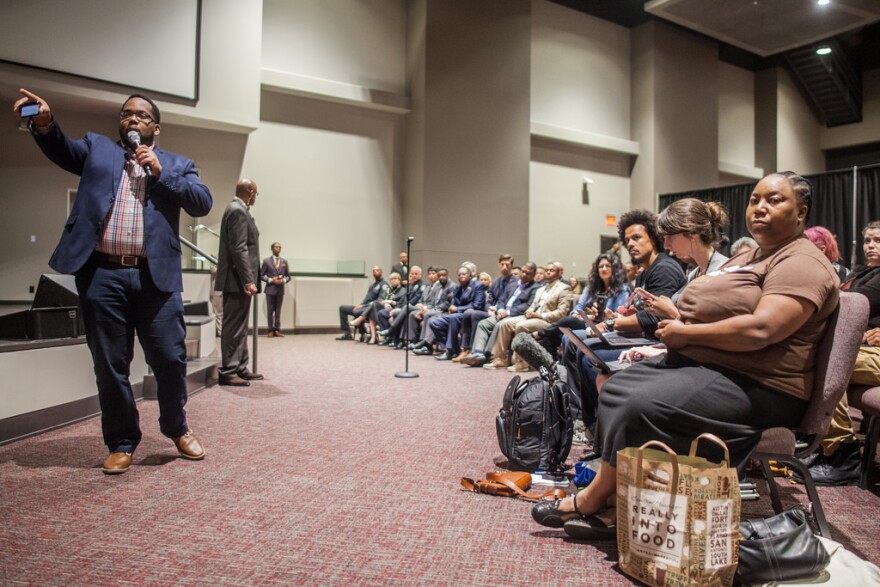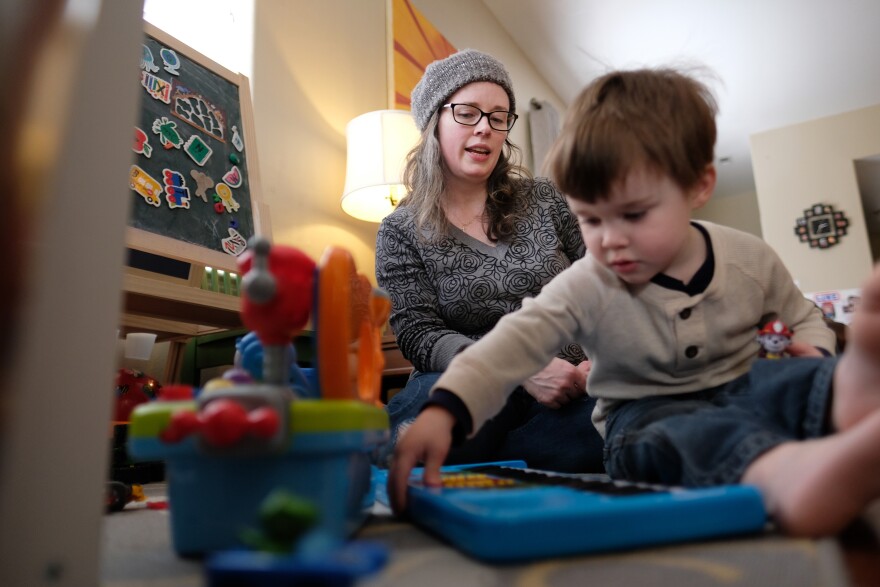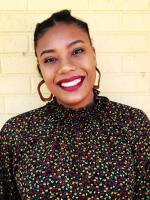On March 2, 2018, Monica Sledge and her 2-year-old son, Luke, were playing in the living room by their back door. Suddenly, there was a loud boom.
“The windows shook,” Sledge said. “My son said ‘bunder,’ [and] I was just like ‘No, it's not thunder.’"
It was the first of six bombs that would explode across Austin last year. The explosion killed Sledge's neighbor, 39-year-old Anthony Stephan House.
Sledge said she grabbed her son and ran into the backroom to wake up her husband before calling 911.
It’s been a year since a series of bombings rocked Austin – killing House and 17-year-old Draylen Mason, and injuring four others.
On the anniversary of the bombings, the community is hosting events to remember the victims. But remembering what happened hasn’t been hard for some – especially, neighbors who are still recovering.
RELATED | Austin Youth Orchestra Tribute Concert Remembers Spirit Of Draylen Mason, Who Died In Bombings
Sledge has lived in the North Austin neighborhood since 2013. She said she had talked to House on several occasions and remembered him as being nice. That’s why she found it odd that House’s death was being investigated in relation to a drug raid that happened three days earlier.
“I really admired him as a neighbor and his house was always so impeccable," she said, "but I started thinking like, ‘Well, I mean, I didn't really know him."
Ten days later, a similar scene unfolded on Diana De La Fuente’s street in the Montopolis neighborhood. She said she and her family were in the living room watching TV when they heard an explosion.
“We all ran outside,” she said.
De La Fuente said they saw 75-year-old Esperanza Herrera on the ground in front of her home and ran over to help her and her mother. Shortly after, federal agents arrived and asked neighbors to leave their homes. The agents taped off parts of the area.

De La Fuente said she didn’t know that just a few hours earlier, a similar bomb had exploded on Oldfort Hill Drive, killing Draylen Mason and seriously injuring his mother.
She and the other neighbors were allowed back into their homes several days later.
“Everybody was on high alert, some people weren’t going to work, some people weren’t sending their kids to school,” said Chas Moore, executive director of Austin Justice Coalition, which advocates for racial and economic equity.
After the two bombings, the organization held a community town hall, bringing city officials and residents together to address concerns.

“I think we had a responsibility to do our part to make sure everybody knew that they were safe,” Moore said.
He called for neighbors to connect with one another for safety. He said that’s challenging because of changing neighborhoods and because people just don't talk to people anymore.
During the investigation, Austin police and federal officials encouraged neighbors to connect through apps like Nextdoor, a private social network for neighborhoods.
Data analysts compared Nextdoor activity between March and May 2018 to the three previous months. Signups for the app increased in three of the four neighborhoods where bombs went off: 145 percent in the Travis Country neighborhood, where two men were injured; 75 percent in the Harris Ridge neighborhood, where Sledge lives; and 20 percent in De La Fuente's Montopolis neighborhood.
The spike in the Montopolis neighborhood was “fairly small,” a Nextdoor representative said, but "for Travis Country and Harris Ridge, where the spikes were significant, [Nextdoor] feels confident that these spikes were related to the bombings."
Sledge said she’s seen more video doorbells since last spring and that she's more apprehensive about opening her door to strangers. The trauma from the bombings took a toll, she said, and she sought counseling.
“I was having uncontrollable crying and I was extremely nervous,” she said.
She said Luke, who's now 3, acted out more and was fussy in the days after the first bombing, but now he’s OK.
De La Fuente said Herrera’s old house has a motion camera, which wasn’t there last year.

Sometimes “it’s harder to feel safe,” she said. Recovering has been a process for her family and the neighborhood. A rusted hole in her sister’s car caused by the explosion reminds her of the bombings.
Herrera moved out of her home after her mother passed away in January. De La Fuente said it’s hard seeing the changes the new neighbors are trying to make to the house.
De La Fuente said almost everyone in the neighborhood tries to be friendly, but it all could be better.
Sledge said she went to her first homeowners association meeting and has reached out to some of her neighbors a bit more, but as the mother of a 3-year-old, that can be challenging.
“There have been, you know, car break-ins and those kinds of things in the past and we communicate about it on Nextdoor,” she said. “Otherwise, we just don't usually talk to each other, and that's kind of sad.”
Moore said he’s been speaking with Austin Mayor Steve Adler about ways to bridge relationships between residents. He said future community events are possible.
Until then, Sledge said she’ll continue to try to reach out to the people who live around her – including House’s family, who still stay around the corner.
“Should I leave some flowers over there?” Sledge said. “I don't really know them, and I feel like it might look weird if I just walk up to their house and say, ‘I'm thinking about you.’”





